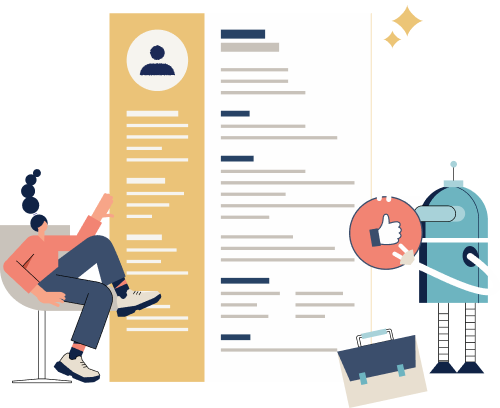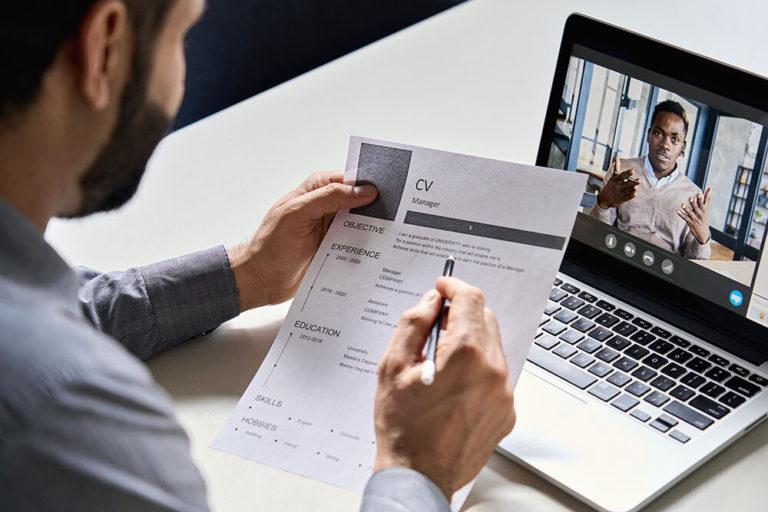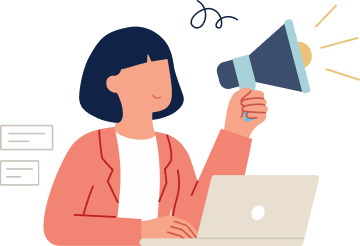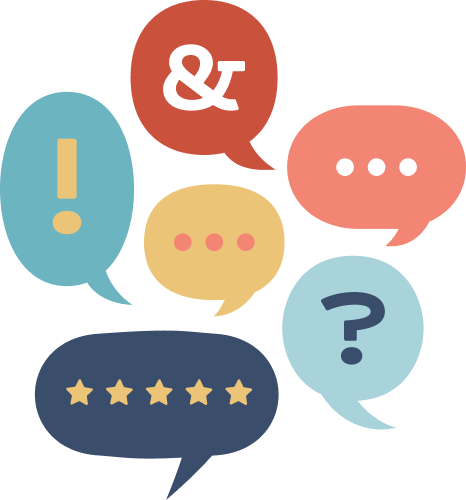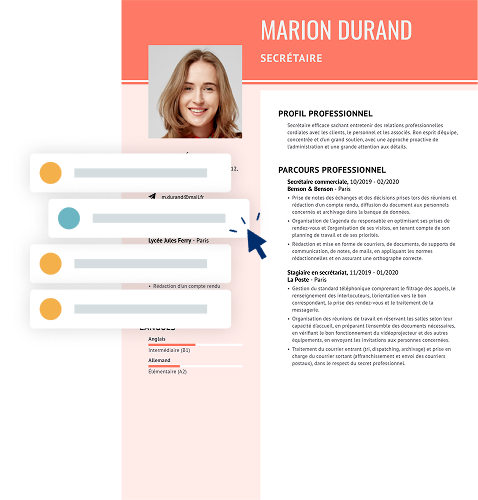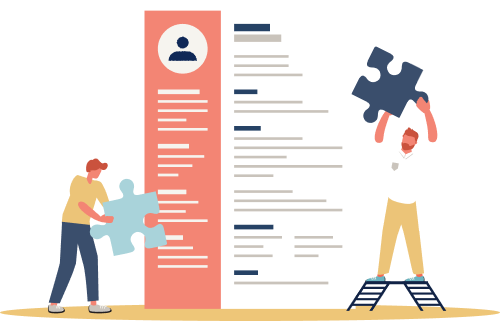How to Prepare for a Job Interview: Complete 2026 Guide
Want to ace your next interview? Our complete job interview preparation guide shows you how to research a company, practise answers, handle nerves, and perform well in all kinds of interviews.

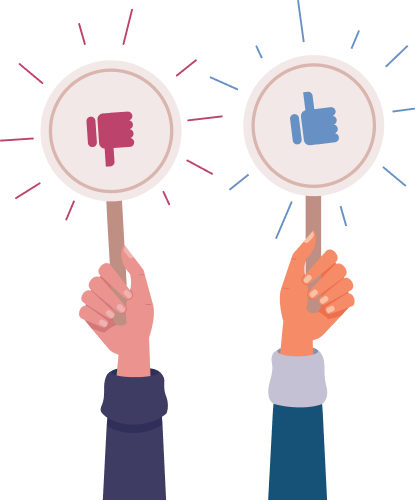
Our customers have been hired by: *Foot Note
Walking into an interview without proper preparation is like turning up to a marathon without training. Take it from someone who recently started running: you won’t get very far.
Good job interview preparation doesn’t just help you look professional; it also builds confidence and gives you the tools to handle whatever questions are thrown your way. In this article, I’ll give you clear, step-by-step advice on how to prepare, from researching the company to rehearsing your answers and planning the practical details.
How to prepare for a job interview in 4 steps
You have already passed several hurdles to get to this point. Writing a CV, creating a cover letter, the arduous process of searching and applying for jobs… Don’t fall in the last stretch. Get ready to ace your job interview.
1. Research the company and the role
One of the best interview tips you’ll ever hear is this: know the employer inside out. Hiring managers can always tell when a candidate hasn’t bothered to learn about the company, and it rarely ends well.
Start by reading the job description carefully. Pick out the top job skills, tools, or experiences they keep mentioning. Then look at the company website, focusing on the “About Us” page, recent news, and any blog or social media updates. This will give you clues about the culture, current challenges, and the type of people they hire.
Go a little deeper if you can. Check competitor websites, industry news, or even LinkedIn profiles of current employees in similar roles. This will allow you to answer questions with the bigger picture (the industry landscape) in mind.
2. Review your CV and cover letter
The next job interview preparation tips are all about refreshing your memory of what’s on your CV. Many candidates stumble when asked about work experiences they included months ago. Go through your CV line by line and think of examples that bring your achievements to life.
If you included a cover letter, revisit it too. Often, the interviewer will use your letter as a starting point for questions. Be ready to expand on anything you highlighted, whether that’s your motivation for applying or a key skill you mentioned.
3. Practise common interview questions
No matter the role, certain job interview questions come up again and again. Questions like “Tell me about yourself,” “What are your strengths and weaknesses?” or “Where do you see yourself in five years?” are classics for a reason. They give employers insight into your personality, ambition, and fit for the job.
The best way to handle them is to prepare short, structured answers. For behavioural questions such as “Tell me about a time you overcame a challenge,” the STAR method (Situation, Task, Action, Result) works brilliantly.
Practise out loud rather than just in your head. Record yourself on your phone, or ask a friend to do a mock interview with you. Hearing your answers out loud will show you where you need to tighten up or where you might be rambling. I’ll mention some popular interview questions and answers later in this article.
4. Plan the logistics
If your interview is in person, plan your route and aim to arrive 10 minutes early. For phone or video interviews, check your technology in advance. Make sure your phone is fully charged, your WiFi connection is stable, and your camera and microphone are working.
Don’t overlook your outfit. Choose something that fits the company culture, but always leans professional. And if it’s a video interview, stick to solid colours, as busy patterns don’t look great on camera.
Preparing for different interview formats
Not all interviews look the same. These days, you might be asked to join a video call from your living room, pick up a surprise phone call, or face a panel in a glass meeting room. Each format presents its own challenges, and the best candidates know how to adapt. Here’s how to prepare for different types of job interviews:
In-person interviews
Traditional face-to-face interviews are still common, especially for the final stages and for non-remote jobs. Here, first impressions matter more than ever. The stereotypical firm handshake, good eye contact, and professional attire truly matter and go a long way.
Use open body language. Sit upright, lean slightly forward, and avoid crossing your arms. Listen carefully and don’t interrupt. Small details like these can make you appear confident and engaged.
If it’s a panel interview, make sure to address each person in the room rather than focusing only on the lead interviewer. This shows you can handle group dynamics.
Phone interviews
Phone interviews are often the first stage of the process, used to filter candidates before inviting them to meet in person. The biggest challenge here? You can’t rely on body language or eye contact to help build rapport.
Find a quiet space with no distractions, and keep your CV in front of you for reference. Stand or sit upright while speaking, as it helps your voice sound more confident. Smiling also changes your tone of voice, making you sound warmer and more enthusiastic.
Since the interviewer can’t see you, your clarity and energy matter more. Speak at a steady pace, and pause briefly to give the interviewer time to respond.
Video interviews
Hiring for remote jobs means video interviews are now standard. My best video interview preparation tips include checking your internet connection, camera, and microphone well before the call.
Choose a quiet location with good lighting. Sit facing a window if possible, or use a lamp to brighten your face. Keep the background neutral. Tidy bookshelves or plain walls work best.
During the interview, look directly at the camera rather than the screen. This creates the impression of eye contact. Keep notes handy, but don’t read from them word-for-word, as interviewers will notice.
Read more: See the latest details and statistics on the current landscape and future prospects of remote work in the UK.
Technical or task-based interviews
In some fields, such as IT, engineering, finance, or consulting, you may face technical interviews or be asked to complete a case study or skills test.
Revise the fundamentals of your field and practise sample tasks in advance. If it’s a coding interview, run through problems on platforms like HackerRank or LeetCode. If it’s a business case study, practice structuring problems logically and explaining your thought processes.
Don’t panic if you don’t get the “right” answer. Often, interviewers are more interested in how you approach the problem (demonstrating problem-solving skills) than in whether your solution is perfect.
Behavioural interviews
Many employers use behavioural interview questions to test how you handle real-life situations. These questions often start with phrases like:
- “Tell me about a time when…”
- “Give an example of how you…”
- “Describe a situation where you had to…”
The STAR method (Situation, Task, Action, Result) is your best friend here. Keep answers structured, focused, and results-oriented. For example, if asked about conflict, you might explain the context, what your role was, how you handled it, and the outcome of your actions.
Tips for a successful job interview
No matter if you’re sitting in a boardroom, on a video call, or speaking over the phone, the core principles of a successful interview are the same. Preparation will get you in the door, but how you present yourself in the moment can make the difference between a polite rejection and a job offer.
Here are the most effective job interview tips to help you shine:
1. Show genuine enthusiasm
Employers want to see and feel your energy. Express interest in the role, the company, and the team. A positive attitude is often remembered as strongly as your skills. For some recruiters, a less experienced but motivated candidate is more appealing than an experienced, unenthusiastic one.
2. Listen actively
Many candidates prepare their answers so thoroughly that they forget to actually listen. Pay close attention to each question and pause for a moment before answering. This shows respect and helps you avoid rambling off-topic.
3. Keep answers clear and concise
Interviewers don’t want long monologues. Use short sentences, avoid jargon, and stick to the point. If a question is broad, structure your answer using frameworks like STAR (Situation, Task, Action, Result).
4. Match your tone and body language
If the interviewer is formal, keep your tone professional. If they’re more relaxed, a warm and conversational style works. Mirror their pace and energy. It helps build rapport and shows you have great communication skills.
A meta-analysis of over 70 papers on non-verbal communication in job interviews found that the non-verbal cues with the strongest association with interview performance were:
| Non-Verbal Cue | Correlation | Key Contextual Notes |
|---|---|---|
| Professional Appearance | Strong positive correlation | The strongest non-verbal predictor. The effect is stronger for female candidates. |
| Eye Contact | Moderate positive correlation | Consistently ranked as a top factor influencing ratings. Conveys engagement and interest. |
| Head Movement | Moderate positive correlation | Includes cues like nodding, which signal active listening and agreement. |
| Posture | Weak positive correlation | Sitting upright and leaning forward slightly conveys confidence and interest. |
| Smiling | Weak positive correlation | Increases positive interviewer evaluations and perceptions of warmth. |
| Anxious Behaviours | Negative correlation | Fidgeting and gaze aversion are negatively related to performance ratings. |
5. Prepare thoughtful questions
At the end of almost every interview, you’ll be asked: “Do you have any questions for us?” Always say yes. Ask about the company’s goals, the team you’d be joining, or how success will be measured in the role. It shows you’re engaged and thinking ahead.
6. Stay calm under pressure
If you don’t know the answer to a question, it’s better to take a breath and think than to panic. You can say, “That’s a great question. Let me think for a moment.” This demonstrates composure and your critical thinking skills.
Job interview questions to prepare for
Most interviewers rely on a core set of questions to understand your skills, motivation, and personality. Preparing for these ahead of time can dramatically boost your confidence. Below are the most common job interview questions, along with some guidance on how to answer them.
Read more: For a more comprehensive list, read our dedicated article on common job interview questions and answers.
“Tell me about yourself.”
It technically isn’t a question, but it’s still something most recruiters lead the interview with. What’s important is that they aren’t asking you for an autobiography. What they mean is: “Briefly tell me about your career progression and your future plans”.
Sample answer:
“I started my career in customer service, where I built strong communication and problem-solving skills while helping clients resolve issues quickly. After three years, I moved into a team leader role, where I managed a group of 12 and focused on improving operational efficiency. One of my biggest achievements was leading a project that reduced our average response time by 25%, which directly improved customer satisfaction scores. Currently, I’m looking to move into a position where I can use my leadership experience and passion for improving customer journeys to contribute to a company that values innovation and growth—qualities I know are central to this organisation.”
“What are your strengths and weaknesses?”
The goal here is to show self-awareness. Pick strengths that directly match the role, and share weaknesses that you’re actively improving. Avoid using good traits as weaknesses, like: “My greatest weakness is that I’m too hardworking”. That’s not a weakness, that’s borderline narcissism.
Sample answer:
“One of my biggest strengths is organisation. I’m very good at managing multiple projects at once without losing sight of deadlines or quality. For example, in my last role, I coordinated three simultaneous product launches, keeping them all on track and under budget. A weakness I’ve worked on is public speaking. Early in my career, I found it nerve-wracking to present in front of senior leaders. To improve, I joined a local public speaking workshop and started volunteering to lead team presentations. Over time, I’ve become much more confident and now regularly present project updates to directors and clients.”
“Why do you want this job?”
This is where you connect your motivation to what the company has to offer. Be specific and reference the company values if possible. Most importantly, avoid sounding desperate for a job, even if you are.
Sample answer:
“I want this job because it perfectly combines my skills with my career ambitions. I’ve always admired your company’s commitment to sustainability, and with my background in supply chain management, I see a real opportunity to contribute. In my previous role, I redesigned a logistics process that cut costs by 15% while reducing our carbon footprint, which taught me how to balance efficiency with environmental responsibility. I believe I could bring that same mindset and experience to this role, helping your team reach its ambitious growth and sustainability goals.”
“Where do you see yourself in five years?”
Employers don’t expect you to predict the future, but they do want to know you’re ambitious and see a future with them. Under no circumstances should you give them a hint that you want to switch jobs at another opportunity.
Sample answer:
“In five years, I’d like to see myself in a senior management role where I’m leading larger teams and shaping strategy. I’m especially interested in mentoring junior colleagues, as I’ve really enjoyed coaching new hires in my current position. My goal is to keep building my leadership skills and industry expertise, and I see this role as the right foundation to achieve that. I know this company has a strong track record of promoting from within, and I’m excited by the opportunity to grow here long term.”
“Tell me about a time you overcame a challenge.”
This is a classic behavioural interview question, so use the STAR method: Situation, Task, Action, Result. It’s like writing an accomplishment for a CV, but with a larger character limit.
Sample answer:
“In my previous role, we faced a serious issue when one of our main suppliers had a delay that threatened to push back a product launch by two months. As project lead, my task was to keep the launch on schedule without increasing costs. I quickly sourced alternative suppliers, renegotiated delivery terms, and reorganised the project timeline to minimise disruption. I also kept all stakeholders updated with clear, transparent communication. In the end, we launched on time, and by negotiating better rates with the new supplier, we actually reduced overall costs by 8%. It was a stressful situation, but it proved my ability to stay calm under pressure and focus on results.”
Questions to ask during a job interview
At the end of almost every interview, you’ll hear the words: “Do you have any questions for us?” Many candidates make the mistake of saying no. But asking the right questions is one of the best ways to stand out. It shows you’ve done your research, you’re engaged, and you’re thinking about how you’d contribute to the company.
Here are some of the best questions to ask in a job interview:
“How is performance measured here?”
Every company has different benchmarks. Knowing whether they focus on KPIs, project outcomes, or customer satisfaction helps you understand expectations from day one.
“Can you tell me more about the team I’d be joining?”
This question helps you get a feel for team culture, reporting structures, and collaboration styles.
“What do you enjoy most about working here?”
This turns the tables and lets you hear about the culture and values from someone on the inside.
“What opportunities for growth and skills development are there in the company?”
This question suggests you’re in it for the long run and are looking to develop your skill set with the company.
“What are the next steps in the hiring process?”
A practical but essential question. It shows you’re interested and helps you prepare for what comes next.
Tips for following up after a job interview
Just finishing an interview isn’t the end of the process; what you do afterwards also matters. Sending a professional thank-you note and following up in the right way can reinforce your interest and keep you top of mind with the hiring manager. That reduces the risk of getting ghosted.
The most effective follow-up after an interview is a short, polite thank-you email sent within 48 hours. Include:
- A genuine thank you for the opportunity.
- A reference to something specific discussed in the interview.
- A reminder of how your skills match their needs.
- A polite closing that expresses interest in next steps.
Your follow-up is also a chance to remind the interviewer of your strengths, especially if you forgot or didn’t have enough time to mention something. For example, you could briefly highlight an achievement you didn’t get to mention during the interview, or underline how your skills align with the company’s upcoming challenges.
If you haven’t heard back after about one to two weeks, it’s appropriate to send a polite follow-up email. Keep it short and express continued interest in the role, ask if there are any updates, and thank them again for their time.
If you still don’t get a reply, move on. Some companies won’t provide feedback, but staying professional ensures you don’t burn bridges for future opportunities.
Key takeaways
Preparing for a job interview doesn’t have to feel overwhelming. If you break it down into steps, you’ll always arrive confident, well-organised, and ready to impress. Here are the essential job interview tips to remember:
- Do your research: Learn about the company, industry, and role so you can tailor your answers and show genuine interest.
- Practise your answers: Prepare for common interview questions using the STAR method, and rehearse out loud to build confidence.
- Plan for the format: Whether it’s in person, by phone, or video, adjust your preparation so you can handle the unique challenges of each type.
- Mind your professionalism: Show enthusiasm, listen actively, ask thoughtful questions, and know your rights around inappropriate interview questions.
- Follow up: Send a thank-you email within 48 hours, politely follow up if needed, and keep communication professional.
FAQ: How to prepare for an interview
How early should I arrive for a job interview?
Aim to arrive 10–15 minutes early. This shows punctuality without putting pressure on the interviewer if they’re running behind. For virtual interviews, log in 5 minutes early to test your audio and camera.
What is the STAR method in interviews?
The STAR method helps you structure answers to behavioural questions:
- Situation – Describe the context.
- Task – Explain your responsibility.
- Action – Outline what you did.
- Result – Share the positive outcome.
How do I prepare for a phone interview?
Find a quiet place with strong reception, keep your CV in front of you, and smile while you speak (it makes your voice sound more positive). Speak clearly and avoid multitasking. Treat it like an in-person meeting.
How do I prepare for a video interview?
Check everything (camera, microphone, internet) in advance. Choose a quiet, well-lit space with a neutral background. Dress professionally from head to toe, and look into the camera to create eye contact.
How long do job interviews usually last?
Most interviews last 30 to 60 minutes, though panel interviews or final rounds can go longer. Phone screenings may take just 15–20 minutes.
What are the signs that my job interview went well?
Positive signs include:
- The interviewer seemed engaged and asked detailed follow-up questions.
- You were told about next steps or timelines.
- The conversation flowed naturally and ran longer than scheduled without the interviewer noticing the flow of time.
What should I wear to a job interview?
Research the company culture. For most roles, business professional or smart business casual is safest. It’s better to be slightly overdressed than underdressed. Always aim for neat, clean, and professional outfits.
What questions are illegal or inappropriate in an interview?
Employers should not ask about age, marital status, religion, sexual orientation, political views, or health conditions. If asked, politely redirect back to discussing role-relevant subjects.

Mariusz Wawrzyniak
Senior Content Writer
Mariusz is a career expert at My Perfect CV who writes practical, research-based guides that help professionals from all industries craft impactful CVs, write compelling cover letters, and advance their careers.
*The names and logos of the companies referred to above are all trademarks of their respective holders. Unless specifically stated otherwise, such references are not intended to imply any affiliation or association with myperfectCV.




